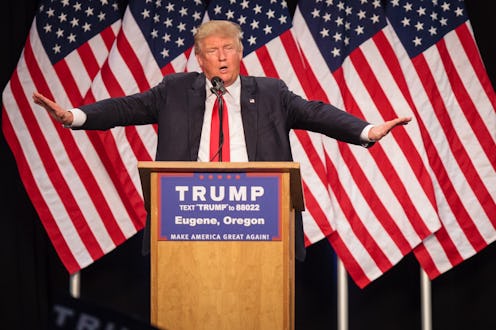News
Plenty Remains Before The General Election Starts
The anti-establishment candidates did well last night. Donald Trump won big in Nebraska and even bigger in West Virginia. He even swept the delegates in both races. Bernie Sanders too won in West Virginia, with over 50 percent of the vote and exit polls showing that plenty of Democrat voters in the state would vote for Trump over Hillary Clinton in the general election, as good as an argument as he'll get to stay in the race. But no candidate — in either party — has a majority of delegates. So what comes after Nebraska and West Virginia?
The next primaries are next Tuesday in Kentucky and Oregon. Democrats will be voting in both states, but Republicans already caucused in Kentucky. Trump came out first, of course. Now Trump is 153 delegates short of the majority for the nomination. However, in Oregon there are only 28 Republican delegates available, meaning Trump won't make it over the hump until the last day of GOP primaries on June 7.
For the Democrats, there are 55 pledged delegates available in Kentucky for Clinton and Sanders to fight over and another 61 pledged in Oregon. There aren't any polls available, but according to FiveThirtyEight, Oregon favors Sanders, while Kentucky favors Clinton. Clinton leads the pledged delegate contest by about 300, and at this rate she's the only one who will reach a majority of pledged delegates. The Democratic race will also likely be clinched on June 7, though there is one last primary on June 14 in D.C.
Trump has already pivoted to the general election, and has begun to talk of naming his running mate. The presumptive nominee said he has a list of five or six people that he's considering; he wouldn't give names, but did not rule out New Jersey Gov. Chris Christie. The announcement will come, he said, during the July Republican National Convention, which Trump claims he will run like entertainment television, something that could be hampered if Cruz delegates don't go along with Trump's vision for the party platform, for example.
The Democratic National Convention could also be similarly dramatic if the race for the nomination continues. Sanders has claimed he will pressure superdelegates to support him as he is the more electable candidate according to current polls. He said Tuesday night that he is in the race to win, but he also hinted that he would seek to unite the party at some point. "While we have many disagreements with Secretary Clinton, there is one area where we agree and that is we must defeat Donald Trump," Sanders said at a rally in Oregon Tuesday. The question is when.
Clinton's camp also began looking at possible vice presidential picks — at least as far back as April if not before. The New York Times reported that she is open to a woman but the ultimate goal is to find a winner who can dominate the VP debate and convince people to vote for her. Sanders didn't rule out joining the Clinton ticket in an interview on CNN Friday. He focused his answer on winning the nomination and making the Democratic platform more progressive, before saying, "Certainly Secretary Clinton and I can talk and see where we go from there."
That means you might have to wait until July — after all the remaining primaries and the conventions — to learn who the VP picks will be. Only then will the general election race truly begin.
